How We Forgot the Cold War
ICW In Conversation with Jon Wiener
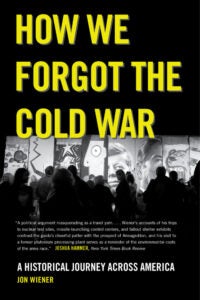
November 30, 2012
Munger Research Center, Seaver Classroom 3, The Huntington
In “How We Forgot the Cold War: A Historical Journey Across America,” Jon Wiener criss-crosses the U.S., visiting almost two dozen Cold War museums, monuments, and historical sites. What he finds is remarkable: Despite the 1991 appropriation of $10 million to create a program that would help future generations appreciate the significance of the Cold War, the monuments weren’t built, the historic sites have few visitors, and many of the museums have shifted focus to other topics. The problem: the public has not embraced the conservatives’ view that “Ronald Reagan won the Cold War.” Instead, public response to that message has ranged from apathy, to skepticism, to resistance.
This conversation is part of a brown bag luncheon series sponsored by ICW.
-
He’s taught American history at UC Irvine–especially the course “Politics from FDR to Obama,” and he’s a long-time contributing editor at The Nation, where he hosts the magazine’s weekly podcast “Start Making Sense.” His guests there have included Naomi Klein, Gail Collins, Chris Hayes, Paul Krugman, Rebecca Solnit, and Barbara Ehrenreich.
His recent books include How We Forgot the Cold War: A Historical Journey Across America — the New York Times Book Review called it “A political argument masquerading as a travel yarn…. Convincing.” He’s also the author of Conspiracy in the Streets: the Extraordinary Trial of the Chicago Eight, which includes illustrations by Jules Feiffer and a cover photo by Richard Avedon.
This Indian Country
ICW In Conversation with Frederick Hoxie
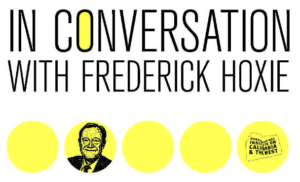
November 5, 2012
Munger Research Center, Seaver Classrooms, The Huntington
While American Indian political activists have long been dismissed as “assimilated” people cut off from the mainstream of tribal life, this new monograph demonstrates that Indian political activism is older than the United States and that the activists’ political agenda emerged from the struggles of dozens of individuals working in a variety of cultural settings. Frederick Hoxie’s newest book, This Indian Country, demonstrates that Native activists were the principal authors of the ideas opened a space for Native people, both in the law and in American society.
This conversation is part of a brown bag luncheon series sponsored by ICW.
-
Fred Hoxie is a professor emeritus at the University of Illinois at Urbana-Champaign where he was formerly the Swanlund Professor of History, Law, and American Indian Studies. An elected member of the American Academy of Arts and Sciences, he has served as a consultant both to Indian tribes and government agencies. His current research focuses on American Indian and indigenous political activism in the United States and beyond. His publications include A Final Promise: The Campaign to Assimilate the Indians (1984); Parading Through History: The Making of the Crow Nation in America, 1805-1935 (1995); Talking Back to Civilization: Indian Voices from the Progressive Era (2001); The People: A History of Native America (2007), with David Edmunds and Neal Salisbury; Lewis and Clark and the Indian Country (2007), with Jay Nelson; This Indian Country: American Indian Political Activists and the Place They Made (2012), which won the Western History Association’s Caughey Prize, and The Oxford Handbook of American Indian History (2016).
North American Environments Seminar
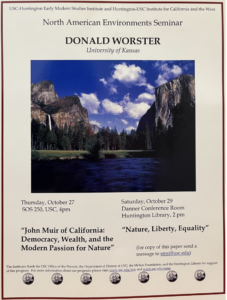
October 27 and 29, 2012
Social Sciences Building Room 250, USC
Danner Conference Room, The Huntington
Donald Worster of University of Kansas shares his work on “John Muir of California: Democracy, Wealth, and the Modern Passion for Nature” on Thursday, October 27th and “Nature, Liberty, Equality” on Saturday, October 29th.
-
Donald Worster went to the University of Kansas in 1989 from Brandeis University in Massachusetts. He has also taught at Yale University and the University of Hawaii and has held fellowships from the Guggenheim Foundation, the Australian National University, the National Endowment for the Humanities, the Mellon Foundation, and the American Council of Learned Societies. His most recent book, A Passion for Nature: The Life of John Muir, was published by Oxford in 2008 and was named the best work of non-fiction by the Scottish Arts Council and won the Ambassador Award for Biography from the English Speaking Union. Earlier books include A River Running West, The Wealth of Nature, Under Western Skies, Rivers of Empire, Dust Bowl, and Nature’s Economy, which together have won more than dozen book prizes. He is former president of the American Society for Environmental History and a member of the American Academy of Arts and Sciences. Over the past two decades he has lectured extensively in Europe, Africa, Asia, and Central America, as well as throughout North America, and his writings have been translated into six languages.
Things I’d Like To Know About Los Angeles Workshop
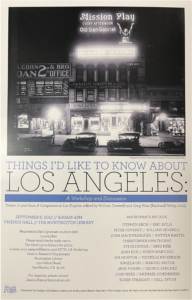
September 8, 2012
Friends Hall, The Huntington
Drawn in part from A Companion to Los Angeles, edited by William Deverell and Greg Hise (Blackwell-Wiley, 2010)
Participants include: Stephen Aron, Eric Avila, Peter Coveney, William Deverell, John Mack Faragher, Anthea Hartig, Christopher Hawthorne, Steve Hindle, Greg Hise, Josh Kun, Ruben Martinez, Jim Newton, Michelle Nickerson, Angela Oh, Manuel Pastor, Jane Pisano, George Sanchez, Josh Sides, Raphael Sonenshein, Susan Straight, Dell Upton
___________________________________________________________________
Mothers of Conservatism: Women and the Postwar Right
ICW In Conversation with Michelle Nickerson
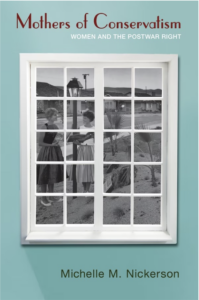
September 7, 2012
Munger Research Center, Seaver Classrooms, The Huntington
Michelle Nickerson joins ICW Director William Deverell to discuss her new book, Mothers
of Conservatism: Women and the Postwar Right.
This conversation is part of a brown bag luncheon series sponsored by ICW.
-
Michelle Nickerson is Assistant Professor of History at Loyola University, Chicago where she teaches U.S. women’s, gender, and urban history. Nickerson recently published Mothers of Conservatism: Women and the Postwar Right, which documents the grassroots activism of conservative women in Cold War Los Angeles and explores the impact of that activism on the emerging American right. This work has led to her interest in regional and metropolitan political-economic development, which she examines in a volume essays, co-edited with historian Darren Dochuk called Sunbelt Rising: The Politics of Place, Space, and Region published by the University of Pennsylvania Press in 2011.
Gardens for a Beautiful America, 1895- 1935
ICW In Conversation with Sam Watters
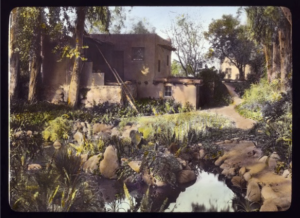
July 27, 2012
Overseers’ Room, The Huntington
When Progressives took on the elevation of American culture and taste after the perceived vulgarities of the Gilded Age, women participated through the beautification of house and garden. In 1913, wives of the period’s one percenters corralled family and friends to found and fund the national Garden Club of America. Determined to promote by example horticultural standards and professional landscape design, members commissioned photo-journalist Frances Benjamin Johnston to document for publication and illustrated lectures gardening successes East and West.
Join ICW Director William Deverell and Sam Watters as they discuss Johnston’s photography in the context of her era’s social and aesthetic agendas, the subject of Watters’ recent book, Gardens for a Beautiful America, 1895- 1935, published in collaboration with the Library of Congress that holds the Johnston architectural archive.
This conversation is part of a brown bag luncheon series sponsored by ICW.
-
Join William Deverell and Sam Watters as they discuss Johnston’s photography in the context of her era’s social and aesthetic agendas, the subject of Watters’ recent book, Gardens for a Beautiful America, 1895- 1935, published in collaboration with the Library of Congress that holds the Johnston architectural archive.
American Eden: From Monticello to Central Park to our Backyards, What Our Gardens Tell Us About Who We Are
ICW In Conversation with Wade Graham
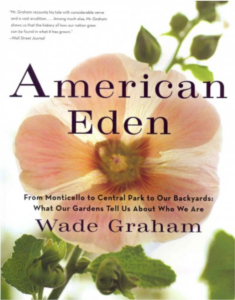
June 14, 2012
Munger Research Center, Seaver Classrooms, The Huntington
Wade Graham explores what four hundred years of garden making in America reveal about our values, politics, and dreams, and how our evolving relationship with Nature in our gardens forms a unique window onto the continuing process of fashioning a national identity in his newly-published book, American Eden: From Monticello to Central Park to our Backyards, What Our Gardens Tell Us About Who We Are (HarperCollins 2011). This social history of gardens in America is an expansive and penetrating exploration of how our evolving relationships with our gardens and landscapes have refl ected our national identity over the course of time.
This conversation is part of a brown bag luncheon series sponsored by ICW.
-
Wade Graham is a writer, historian, & landscape designer with a practice based in Los Angeles. His writing, on cultural history, environment, urbanism, landscape, art, and other topics, has appeared frequently in the Los Angeles Times, the New Yorker, and Harper’s, among other publications.
His books include Braided Waters: Environment and Society in Molokai, Hawaii (University of California Press, 2018), Dream Cities: Seven Urban Ideas That Shape the World (HarperCollins, 2016), and American Eden: From Monticello to Central Park to Our Backyard, What Our Gardens Tell Us About Ourselves (HarperCollins, 2011).
He has a Ph.D in American history from UCLA and has taught urban and environmental policy at the School of Public Policy at Pepperdine University since 2009. Since 1999, he has been a trustee of Glen Canyon Institute, a Colorado River restoration group based in Salt Lake City, Utah.
States of Delinquency: Race and Science in the making of California’s Juvenile Justice System
ICW In Conversation with Miroslava Chávez-García
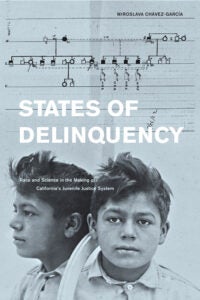
June 1, 2012
Munger Research Center, Seaver Classrooms, The Huntington
Miroslava Chávez-García talks about her most recent book, States of Delinquency: Race and Science in the making of California’s Juvenile Justice System (University of California Press, 2012) uses one of the harshest states—California—as a case study for examining racism in the treatment of incarcerated young people of color. Using rich new untapped archives, States of Delinquency is the fi rst book to explore the experiences of young Mexican Americans, African Americans, and ethnic Euro-Americans in California correctional facilities including Whittier State School for Boys and the Preston School of Industry.
This conversation is part of a brown bag luncheon series sponsored by ICW.
-
Miroslava Chávez-García is Professor of History at the University of California, Santa Barbara, and holds affiliations in the Departments of Chicana/o Studies and Feminist Studies as well as Iberian and Latin American Studies. She also currently serves as the Faculty Director of the McNair Scholars Program.
Author of Negotiating Conquest: Gender and Power in California, 1770s to 1880s (Tucson, 2004) and States of Delinquency: Race and Science in the Making of California’s Juvenile Justice System (Berkeley, 2012), Miroslava’s most recent book, Migrant Longing: Letter Writing across the U.S.-Mexico Borderlands (Chapel Hill, 2018), is a history of migration, courtship, and identity as told through more than 300 personal letters exchanged across the U.S.-Mexico borderlands among family members and friends. Most recently, in 2020, the book was selected as a 2019 Choice Outstanding Academic Title and in 2019 it won the Western Association of Women’s Historians Barbara “Penny” Kanner Award to honor the book that illustrates the use of a specific set of primary sources (such as diaries, letters, and interviews). Her essay, “Migrant Longing, Courtship, and Gendered Identity in the U.S.-Mexico Borderlands,” published by the Western History Quarterly in Summer 2016, received the 2017 Western Association of Women’s Historians Judith Lee Ridge prize and the 2017 Bolton-Cutter Award from the Western History Association for the best article on Spanish Borderlands history.
Working on the Railroad, Working in Beauty
ICW In Conversation with Jay Youngdahl
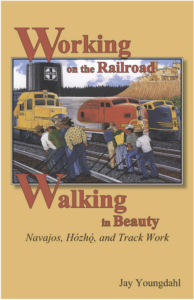
May 11, 2012
Overseers’ Room, The Huntington
Beginning in the 1990s, Jay Youngdahl’s legal work included representing Navajo railroad workers. The cases concerned claims for compensation due to the frequent injuries suffered by Navajos who worked on southwestern railroad track gangs. In the 2000s, Youngdahl began studying the use of existential religious practices by these Navajo workers in their attempt to control the dangers in their work. His study led him to caches of previously unexplored archival documents, which show for the first time the history of how Navajo workers came to work for railroads in large numbers and how the US Government, the railroads, and many trading post owners profited from the work of these men. The result is a comprehensive narrative of the history of Navajo railroad workers and the rich religious and cultural practices they used to make livable lives for themselves in wage work away from their land.
This conversation is part of a brown bag luncheon series sponsored by ICW.
-
Jay Youngdahl is a visiting research professor at CUNY School of Labor and Urban Studies. He has been a Network Fellow at the Edmond J. Safra Center for Ethics and a senior fellow at the Initiative for Responsible Investment in the Hauser Center for Nonprofit Organizations at Harvard University. An attorney, he represents a number of labor-affiliated benefit funds. In addition, he serves as a labor trustee on several such funds and is an independent trustee on the Middletown Works Hourly and Salaried Union Health Care Fund, which provides health insurance to nearly five thousand retired steelworkers and their families.
ICW In Conversation with Keith Woodhouse
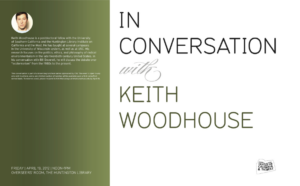
April 19, 2012
Overseers’. Room, The Huntington
Keith Woodhouse is a postdoctoral fellow with the University of Southern California and the Huntington Library Institute on California and the West. He has taught at several campuses in the University of Wisconsin system, as well as at USC. His research focuses on the politics, ethics, and philosophy of radical environmentalism in the late-twentieth-century United States. In his conversation with ICW Director William Deverell, he will discuss the debate over “ecoterrorism” from the 1980s to the present.
This conversation is part of a brown bag luncheon series sponsored by ICW.
-
Keith Woodhouse (Ph.D., University of Wisconsin, 2010) teaches courses for the History Department and the Environmental Policy and Culture program. His research interests are environmental history, intellectual history, political history, and the twentieth-century United States. He is the author of The Ecocentrists: A History of Radical Environmentalism, which focuses on the ideas and political and philosophical commitments that radical environmentalists held and what those commitments tell us about the relationship between the environmental movement and American political thought. He has taught at several campuses in the University of Wisconsin system and held a postdoctoral fellowship at the University of Southern California in Los Angeles.
This Great And Crowded City: Woody Guthrie’s Los Angeles
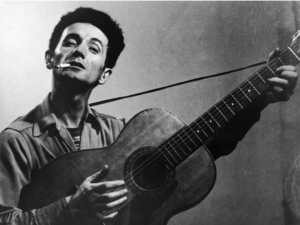
April 14, 2012
USC, Bovard Auditorium
In conjunction with the Visions and Voices program at USC and the GRAMMY Museum of Los Angeles, ICW is proud to present a major conference honoring the life, legacy, and centenary of Woodrow Wilson “Woody” Guthrie. Speakers and musicians highlight Guthrie’s music and rise to fame in Depression-era Los Angeles. Individual presentations discuss such topics as Guthrie’s influences, the power of radio in 1930s Los Angeles, Guthrie’s ties to John Steinbeck and the Joads, as well as the contemporary resonance of Guthrie in folk music and folk migration across borders and boundaries in North America. The pinnacle of the Los Angeles celebration took place on Saturday evening, April 14, with the second installment of This Land Is Your Land ~ The Woody Guthrie Centennial Celebration Concert at Club Nokia at L.A. LIVE in downtown Los Angeles. Performing classic Guthrie songs will be Jackson Browne, David Crosby & Graham Nash, Dawes, John Doe, Richie Furay, Sarah Lee Guthrie and Johnny Irion, Kris Kristofferson, Tom Morello, Joel Rafael, Rob Wasserman and More.
___________________________________________________________________
Sunbelt Rising: The California Origins of the Modern Evangelical Right
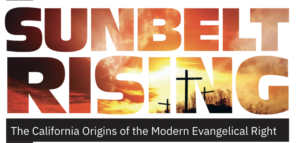
March 1, 2012
USC, Social Sciences Building, History Department
Darren Dochuk—author of From Bible Belt to Sunbelt: Plain-folk Religion, Grassroots Politics, and the Rise of Evangelical Conservatism—will highlight some of the key (and until now, relatively hidden) political dimensions of evangelical conservatism as they emerged in Southern California in the decades following World War II. Connecting current events to deep-rooted historical trends, Dochuk will discuss Southern California evangelicalism’s ongoing influence on our politics as well as some of the innovative and fascinating ways that scholars, journalists and students can uncover this component of American culture in its fullest dimensions.
This programming is brought to you by the USC Knight Chair in Media and Religion, the USC Center for Religion and Civic Culture and the Huntington-USC Institute on California and the West.
-
Darren Dochuk is Associate Professor of History at Purdue University in West Lafayette, Indiana. His first book, From Bible Belt to Sunbelt: Plain-folk Religion, Grassroots Politics, and the Rise of Evangelical Conservatism (Norton, 2011), tracks the emergence of evangelical politics from out of the margins of the Depression-era “Bible Belt” South into the mainstream of California’s “Sunbelt” society. It has garnered a number of awards, including the Society of American Historians’ Allan Nevins Prize and, most recently, the American Historical Association’s John H. Dunning prize.
The Significance of the Frontier in an Age of Transitional History
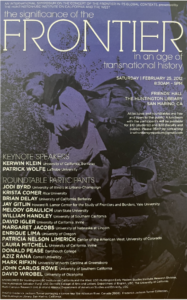
February 25, 2012
Friends’ Hall, The Huntington
Nearly twenty-five years after the interventions of New Western History, a brief survey of recent scholarship on the American West displays a diversity of approaches to the concept of the frontier. In a moment in which scholarship across the humanities continues to seek frames of reference beyond that of the nation-state, scholars of U.S. imperialism utilize the frontier as a concept that describes not only contact between cultures and environments, but as a site (both real and imagined) of community formation and nation building. Borderlands scholars, for instance, have broadened considerably our understandings of La Frontera and its significance in the history of North America. In the world of critical race theory, scholars of settler colonialism have fruitfully reintroduced frontier binaries into their transnational analyses. Critics working in literary and film studies have likewise focused on how these mediums have borrowed from as well as pushed back against the powerful national narratives articulated by Turnerian historiography.
This symposium aims to put some of these diverse views of historical frontiers into conversation with one another and assess the current state of frontier studies. Have historians of the American West, through the synthesis of transnational, borderlands, and environmental history (among other fields), returned, in the words of Kerwin Lee Klein, to telling “big frontier tales” and in the process become “postwestern?” Does Turnerian historiography remain an important object of study for scholars who want to challenge dominant narratives of American power, or has the implementation of transnational and postnational perspectives set aside the decidedly national concerns of Turner and New Western History? If we understand the frontier purely as a myth, how and why does the frontier myth continue to be invoked in such a broad range of political rhetoric
and cultural productions? If, as scholars of settler colonialism argue, the frontier is a narrative structure rather than an historical event, and the binaries between settlers and indigenous peoples are central to the production of power in settler colonies and states, how can the study of frontier historiography inform our understanding of Native Americans’ ongoing struggles tribal sovereignty? Lastly, have these various critical appraisals of the mythologies of colonial settler frontiers–a body of scholarship to which Frederick Jackson Turner and New Western History both belong–had any effect on contemporary popular productions, or do they continue to reside primarily within academic discourses?
This programming is brought to you in partnership with USC-Huntington Early Modern Studies Institute; Research Division, The Huntington; Salvatori Fund, USC Dornsife College of Arts and Letters; Department of English, USC; The University of California Multi-Campus Research Unit in World History; and the Department of American Studies and Ethnicity.